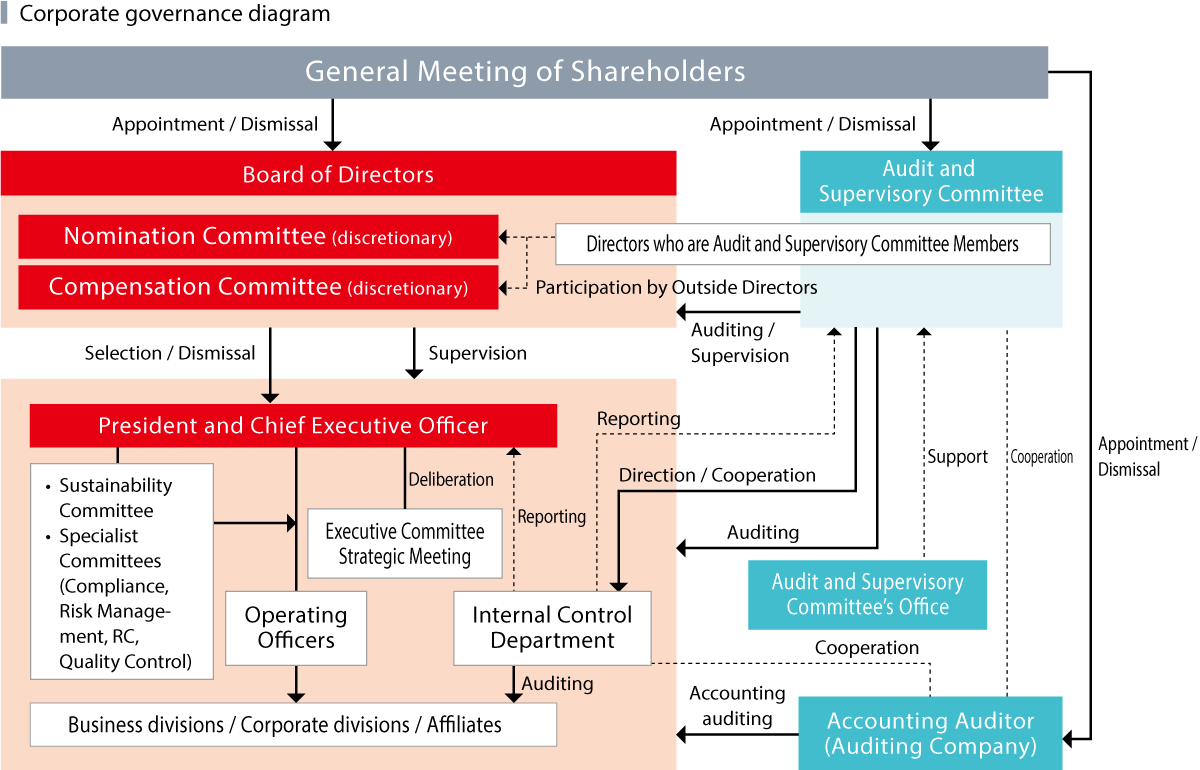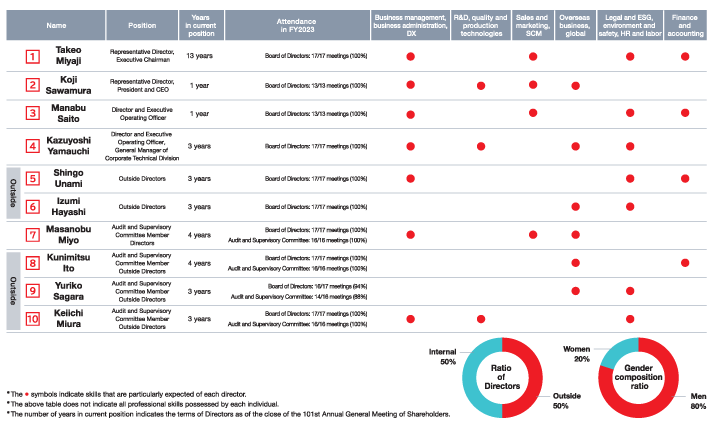Corporate Governance
- TOP
- Sustainability
- Governance
- Corporate Governance
Organizational Setup for Corporate Governance
With a view to architecting a management setup that can appropriately and promptly respond to changes in the business environment, NOF introduced the operating officer system. It was intended to strengthen the decision making function and the supervision function of the Board of Directors and at the same time to enhance the efficiency of the executive setup under authorization by the Representative Director by separating the decision making function and the business executing function of management.

Board of Directors
The Board of Directors, consisting of ten members including five independent Outside Directors, holds one regular meeting every month and extraordinary sessions are also convened as required. Besides deciding on important matters set forth by laws, regulations, the articles of incorporation, and the rules of the Board of Directors, the Board supervises the state of business execution. Any important matter to be referred to the Board of Directors goes through preliminary deliberation, intended to ensure more appropriate decision making, by the Executive Committee from time to time attended by Directors who concurrently serve as Operating Officers, Operating Officers with a title, standing Audit and Supervisory Committee members, and heads of the organizational unit or units concerned, or the weekly Strategic Meeting as a rule attended by the Directors who concurrently serve as Operating Officers and Operating Officers with a title.
Audit and Supervisory Committee
The Audit and Supervisory Committee consists of four Directors, including three independent Outside Directors. In accordance with auditing policy and standards, the standing Audit and Supervisory Committee members play a leading role in attending important meetings including meetings of the Executive Committee, implementing audits through inspection of important documents, and supervising the business execution of Directors. In addition, with regard to internal control, the Committee receives reports on audit plans and audit results conducted by the Internal Control Office, our Internal Audit Department, and confirms the situation to aim for effective collaboration, including giving instructions for investigations as necessary. Moreover, the Committee holds meetings regularly and as necessary with the Accounting Auditor and exchanges relevant information, including receiving reports on audit plans and audit results.
Nomination Committee
In order to improve the oversight function of the Board of Directors and strengthen the corporate governance system, the Nomination Committee, which is a voluntary advisory committee to the Board of Directors, has been established. In consultation with the Board of Directors, the Nomination Committee deliberates and reports to the Board of Directors on matters such as the election and dismissal of directors (excluding Audit and Supervisory Committee members), the selection and dismissal of representative directors, and succession planning for such directors. The committee is chaired by an independent Outside Director, and consists of five independent Outside Directors and two Internal Directors. This ensures the committee’s independence and objectivity.
Compensation Committee
In order to improve the oversight function of the Board of Directors and strengthen the corporate governance system, the Compensation Committee, which is a voluntary advisory committee to the Board of Directors, has been established. The Compensation Committee, in consultation with the Board of Directors, deliberates and reports to the Board of Directors on matters related to the compensation of Directors, excluding Audit and Supervisory Committee members. The committee is chaired by an independent Outside Director, and consists of five independent Outside Directors and two Internal Directors. This ensures the committee’s independence and objectivity.
Accounting auditing
Ernst & Young ShinNihon LLC has been selected as the Accounting Auditor.
Internal control system
Each NOF Group company has developed an internal control system for ensuring adherence to laws and regulations, the articles of incorporation and various internal rules of the Company, and appropriateness of business operations. Each specialist committee conducts audits and investigations to ensure thoroughness. Regarding observance of social norms and laws and regulations, the Company’s code of conduct is formally spelled out as the NOF Code of Ethical Conduct, based on the NOF Basic CSR Policy, and a Compliance Committee is established to ensure thorough adherence to the code. Further, in order to secure safety in production sectors in the Five Core Components, including the environment, products, plants, transportation, and labor, the Responsible Care (RC) rules are instituted, with the RC Committee checking conduct in actual scenes of production and performing internal auditing.
Internal audits
In addition to audits conducted by each risk-related committee, NOF has established the Internal Audit Department to audit the execution of operations encompassing all management activities and report the results to the Representative Director and the Board of Directors. The results of operations audits by the Internal Audit Department are also reported to the Audit and Supervisory Committee as necessary for evaluation and receiving necessary instructions.
The Internal Audit Department, Audit and Supervisory Committee, and Accounting Auditor strive to mutually cooperate by sharing information on their respective annual audit plans and audit results, and exchanging opinions at regular or ad-hoc meetings.
Specialist Committees
Each specialist committee analyzes risks, considers countermeasures, analyzes and evaluates matters under its jurisdiction, and reports to the Board of Directors.
【Sustainability Committee】
The Sustainability Committee was established to promote and develop CSR activities. The Committee deliberates and approves CSR activity plans submitted by each department, and oversees the activities of specialist committees and related departments. The Committee also requests activity reports from and provides advice to affiliate companies through specialist committees and related divisions
【Compliance Committee】
The Compliance Committee was established to promote compliance and roll out corporate activities with high ethical standards. The Committee deliberates and plans matters related to compliance, reports to the Board of Directors, and rolls out the formulated content internally and at affiliate companies.
【Risk Management Committee】
The Risk Management Committee was established to promote risk management. The Committee deliberates and plans basic policies on risk management, reports to the Board of Directors, and rolls out the formulated policies internally and at affiliate companies.
【RC Committee】
The RC Committee was established to ensure implementation of Responsible Care policies and guidelines. The Committee discusses and deliberates support plans and improvement measures regarding important matters concerning Responsible Care activities, submits reports to the President, and rolls out the formulated content to related parties inside and outside the company.
【Quality Management Committee】
We established the Quality Management Committee to ensure the implementation of our Quality Policy in order to “provide the highest quality products and services.” The Committee discusses and deliberates important matters concerning quality management, submits reports to the President, and rolls out the formulated content internally and at affiliate companies.
Officers
Officers
Skill Map

Officer Compensation System
Method of determining policy concerning details of compensation, etc. of individual Directors
Regarding the policy on compensation of Directors (excluding Audit and Supervisory Committee members), after undergoing deliberation by the Compensation Committee, an advisory body to the Board of Directors, a resolution on partial revision of the policy was reached at the Board of Directors meeting held on January 27, 2023.
Overview of contents of determination policy
Under the policy to promote sustainable growth and medium- to long-term enhancement of corporate value based on the Company’s Corporate Philosophy and reward Directors for business results and other achievements through an appropriate level of compensation, compensation for Directors consists of monthly compensation, bonuses, and stock compensation. In order to maintain incentives, at least 40% of the compensation paid is set as performance-linked compensation (bonuses, ESG indicators-linked compensation, stock compensation). (Compensation for Outside directors is limited to fixed compensation.)
Compensation system
【Fixed compensation】
Calculation methods, etc. of fixed compensation for Directors are deliberated by the Compensation Committee and resolved at the Board of Directors meeting. In addition, with regard to the determination of the specific details of the amount of fixed compensation for each individual director, excluding members of the Audit and Supervisory Committee, a resolution is passed by the Board of Directors after deliberation by the Compensation Committee.
【Performance-linked compensation】
(Bonus)
Calculation methods, etc. of bonuses for Directors (excluding Audit and Supervisory Committee members and Outside Directors) are deliberated by the Compensation Committee and resolved at the Board of Directors meeting. The calculation method of the said bonuses is based on consolidated operating income, an important indicator related to the Group’s business performance evaluation. The base amount is multiplied by a designated coefficient determined for each Director position. The Compensation Committee verifies this calculation method and the amount paid in each term.
(ESG indicatorslinked compensation)
At the Board of Directors meeting held on January 27, 2023, it was decided to use a calculation method utilizing the level of achievement of ESG indicators and other factors for a portion of the compensation (monthly compensation) for Directors (excluding Audit and Supervisory Committee members and Outside Directors) in the next term. The calculation method for this compensation is determined by multiplying a standard amount, set for each position, by an evaluation coefficient that reflects the degree of achievement concerning ESG indicators related to the NOF Group’s efforts toward sustainability challenges. The Compensation Committee reviews this calculation method and the payment amounts each fiscal year.
(Stock compensation)
Based on the resolution of the 96th Annual General Meeting of Shareholders held on June 27, 2019, a new performance-linked stock compensation plan (Board Benefit Trust) was introduced. At the 98th Annual General Meeting of Shareholders held on June 29, 2021, NOF transitioned to being a company with an Audit and Supervisory Committee. In conjunction with this transition, the plan applies to Directors who concurrently serve as Operating Officers and Operating Officers with a title (excluding Outside Directors and Audit and Supervisory Committee members, hereinafter collectively “Directors, etc.”).
For each fiscal year, the Directors, etc. are awarded points, the number of which is to be decided taking into account their respective positions, achievement level of their performance, etc. based on the Officer Stock Distribution Rules. Each point awarded to the Directors, etc. is converted into one share of the Company’s common stock at the time of the distribution of the Company’s shares, etc. (In the event of a stock split, allotment of shares without contribution, or a consolidation of shares, the maximum number of points, the number of points already granted, and the conversion ratio will be reasonably adjusted in accordance with such ratio, etc.). The number of points held by a Director, etc., which will be used as the basis for the distribution of the Company’s shares, etc., is, in principle, the number of points awarded to the said Director, etc. by the time of his/her retirement.
The Officer Stock Distribution Rules, which determine the calculation method, etc., which considers such matters as the respective positions and achievement level of performance targets of the Directors, etc., are deliberated by the Compensation Committee and then resolved by the Board of Directors.
《Calculation method of stock compensation》
1. Calculation methods of points awarded
The number of points awarded is calculated by multiplying the number of position-based points, decided for each position, by the performance evaluation coefficient, which is determined by the achievement level, etc. of consolidated operating income and ROE in the Mid-term Management Plan, an important index for the evaluation of the NOF Group’s business performance.
(Formula) Number of position-based points × Performance evaluation coefficient
*Performance evaluation coefficient= (performance evaluation coefficient based on consolidated operating income x 50%) + (performance evaluation coefficient based on ROE x 50%)
*Taking into account the achievement level of performance, the value of the performance evaluation coefficient varies between 0 and 1.5.
2. Distribution methods
Distribution takes place after the retirement of Directors, etc., and the Company’s shares and cash, equivalent to the Defined Number of Points, are distributed (when distributed as survivor benefits, cash is distributed.
3. Achievement level of the targets for consolidated operating income and ROE during the fiscal year
The planned target for consolidated operating income in the 2025 Mid-term Management Plan is ¥46.0 billion (final year of the said plan). The actual result of consolidated operating income in the fiscal year under review was ¥42.1 billion, representing a 99.4% achievement level in the fiscal year, calculated according to the level of growth in the period of the 2025 Mid-term Management Plan. In addition, the ROE target for the final fiscal year of the 2025 Mid-term Management Plan is 12% or more, and the actual ROE for this fiscal year was 13.48%, representing a 112.3% achievement level of the target.
Reasons why the Board of Directors deemed that details of compensation, etc. of individual Directors concerning the fiscal year under review aligned with the determination policy
For matters regarding the compensation system and policy concerning Directors, matters regarding the calculation method in determining specific compensation amounts for Directors, and individual compensation amounts, etc., the Compensation Committee conducts deliberations from a multi-faceted perspective, including compliance with the policy on compensation of Directors. The Board of Directors respects the results of the deliberations, and deems that they are aligned with the said policy. Furthermore, the Compensation Committee consists of five Outside Directors and two Internal Directors, and an independent Outside Director serves as the chairperson.
| Category | Total amount of compe-nsation, etc. (million yen) |
Total amount of compensation, etc. by type (million yen) | Number of eligible officers (people) | ||
|---|---|---|---|---|---|
| Fixed compen-sation | Bonus | Stock compen-sation | |||
| Directors (Excluding Audit and Supervisory Committee members and Outside Directors) | 226 | 137 | 75 | 13 | 6 |
| Audit and Supervisory Committee members (excluding Outside Directors) | 24 | 24 | - | - | 2 |
| Outside Officers | 45 | 45 | - | - | 5 |
2.Separate from the maximum amount of compensation for Directors mentioned in point 1 (excluding Directors who are Audit & Supervisory Committee members), based on the resolution of the 98th Annual General Meeting of Shareholders held on June 29, 2021, the Company will contribute up to a maximum of 12,000 points to the performance-linked stock compensation plan (Board Benefit Trust) for Directors who concurrently serve as Operating Officers, per fiscal year (each point awarded to the Directors, etc. is converted into one share of the Company’s common stock at the time of the distribution of the Company’s shares, etc.). There were four Directors who concurrently served as Operating Officers following the aforementioned Annual General Meeting of Shareholders. * The Company conducted a split of common stock at the ratio of 1 share to 3 shares effective April 1, 2024. Therefore, from that date onward, the maximum total number of points granted per fiscal year to Directors who concurrently serve as Operating Officers is set at 36,000 points.
3.The maximum amount of compensation for Directors who are Audit and Supervisory Committee members (¥80 million per year) was resolved at the 98th Annual General Meeting of Shareholders held on June 29, 2021. There were four Directors who concurrently served as Audit and Supervisory Committee members following the Annual General Meeting of Shareholders.
Board of Directors
Analysis and evaluation of effectiveness of the Board as a whole
NOF analyzes and evaluates the effectiveness of the Board of Directors once a year, in principle. Since fiscal 2016, NOF has implemented an effectiveness evaluation every year. In fiscal 2023, the Company employed a questionnaire form crafted by an external institution, and implemented the Board of Directors effectiveness evaluation questionnaire by surveying all 10 Directors.
By combining a five-level rating scale and open-ended questions, the questionnaire aimed to understand current conditions and identify challenges from both aspects of quantitative and qualitative evaluation. As the questionnaire was answered by sending responses directly to the external institution, anonymity was ensured. The tallying and analysis of the questionnaire forms was also delegated to an external institution, for the purpose of securing objectivity and further increasing the effectiveness of the Board of Directors going forward. Based on the tallying and analysis of the results of the external institution, the Board of Directors conducted a deliberation and evaluation in April 2023.
《Question matters in the questionnaire (30 total questions)》
●Roles and functions of the Board of Directors (5 questions)
●Scale and composition of the Board of Directors (4 questions)
●Operation of the Board of Directors (5 questions)
●Cooperation with auditing institutions, etc. (4 questions)
●Relationship with Outside Directors (3 questions)
●Relationship with shareholders and investors (3 questions)
●Future direction of the Board of Directors’ function (1 question)
●Degree of Improvement (1 question)
●Open-ended section (4 questions)
Summary of results for fiscal 2023 effectiveness evaluation
The NOF Board of Directors ensures a suitable diversity of knowledge, experience, and abilities necessary in light of management strategies and provides appropriate opportunities to utilize the experience and expertise of Outside Directors. It was confirmed that based on the Corporate Philosophy and values of the NOF Group, the Board of Directors is generally operating appropriately, with Directors freely and openly expressing their opinions while leveraging their careers and expertise, open and active discussions taking place as a Board of Directors, and ensuring of sufficient time for deliberation on important matters.
To further enhance the overall governance structure, the challenge recognized in the fiscal 2022 effectiveness evaluation, the Board of Directors decided to appoint the C-suite to direct strategies across the entire Company. Through this initiative, we will further strengthen our governance structure.
Points of improvement for the future
It was confirmed that the Company will continue to further expand the agenda of the Board of Directors to include discussions toward the realization of cost of capital-conscious management and on non-financial information, such as sustainability.


